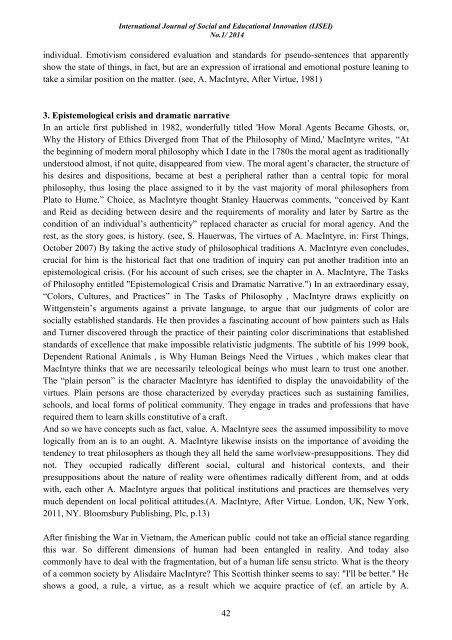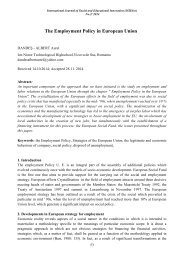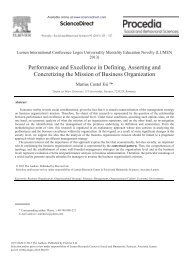International Journal of Social and Educational Innovation (IJSEI)
International Journal of Social and Educational Innovation (IJSEI) publishes research paper in the field of: Social Science and Humanities, Education, Psychology, Philosophy, Logics, Ontology and Philosophy of Science, Political Science, History, Sociology, Business and Marketing, Economics, Financial Development, Accounting, Banking, Management, Human Resources, Law, Public Administration Environmental Studies, Climate Change, Educational Technology, Language and Linguistics and so on. All papers which will be sent for evaluation/ publishing must contain educational approaches.
International Journal of Social and Educational Innovation (IJSEI) publishes research paper in the field of: Social Science and Humanities, Education, Psychology, Philosophy, Logics, Ontology and Philosophy of Science, Political Science, History, Sociology, Business and Marketing, Economics, Financial Development, Accounting, Banking, Management, Human Resources, Law, Public Administration Environmental Studies, Climate Change, Educational Technology, Language and Linguistics and so on.
All papers which will be sent for evaluation/ publishing must contain educational approaches.
Create successful ePaper yourself
Turn your PDF publications into a flip-book with our unique Google optimized e-Paper software.
<strong>International</strong> <strong>Journal</strong> <strong>of</strong> <strong>Social</strong> <strong>and</strong> <strong>Educational</strong> <strong>Innovation</strong> (<strong>IJSEI</strong>)<br />
No.1/ 2014<br />
individual. Emotivism considered evaluation <strong>and</strong> st<strong>and</strong>ards for pseudo-sentences that apparently<br />
show the state <strong>of</strong> things, in fact, but are an expression <strong>of</strong> irrational <strong>and</strong> emotional posture leaning to<br />
take a similar position on the matter. (see, A. MacIntyre, After Virtue, 1981)<br />
3. Epistemological crisis <strong>and</strong> dramatic narrative<br />
In an article first published in 1982, wonderfully titled 'How Moral Agents Became Ghosts, or,<br />
Why the History <strong>of</strong> Ethics Diverged from That <strong>of</strong> the Philosophy <strong>of</strong> Mind,' MacIntyre writes, ―At<br />
the beginning <strong>of</strong> modern moral philosophy which I date in the 1780s the moral agent as traditionally<br />
understood almost, if not quite, disappeared from view. The moral agent‘s character, the structure <strong>of</strong><br />
his desires <strong>and</strong> dispositions, became at best a peripheral rather than a central topic for moral<br />
philosophy, thus losing the place assigned to it by the vast majority <strong>of</strong> moral philosophers from<br />
Plato to Hume.‖ Choice, as MacIntyre thought Stanley Hauerwas comments, ―conceived by Kant<br />
<strong>and</strong> Reid as deciding between desire <strong>and</strong> the requirements <strong>of</strong> morality <strong>and</strong> later by Sartre as the<br />
condition <strong>of</strong> an individual‘s authenticity‖ replaced character as crucial for moral agency. And the<br />
rest, as the story goes, is history. (see, S. Hauerwas, The virtues <strong>of</strong> A. MacIntyre, in: First Things,<br />
October 2007) By taking the active study <strong>of</strong> philosophical traditions A. MacIntyre even concludes,<br />
crucial for him is the historical fact that one tradition <strong>of</strong> inquiry can put another tradition into an<br />
epistemological crisis. (For his account <strong>of</strong> such crises, see the chapter in A. MacIntyre, The Tasks<br />
<strong>of</strong> Philosophy entitled "Epistemological Crisis <strong>and</strong> Dramatic Narrative.") In an extraordinary essay,<br />
―Colors, Cultures, <strong>and</strong> Practices‖ in The Tasks <strong>of</strong> Philosophy , MacIntyre draws explicitly on<br />
Wittgenstein‘s arguments against a private language, to argue that our judgments <strong>of</strong> color are<br />
socially established st<strong>and</strong>ards. He then provides a fascinating account <strong>of</strong> how painters such as Hals<br />
<strong>and</strong> Turner discovered through the practice <strong>of</strong> their painting color discriminations that established<br />
st<strong>and</strong>ards <strong>of</strong> excellence that make impossible relativistic judgments. The subtitle <strong>of</strong> his 1999 book,<br />
Dependent Rational Animals , is Why Human Beings Need the Virtues , which makes clear that<br />
MacIntyre thinks that we are necessarily teleological beings who must learn to trust one another.<br />
The ―plain person‖ is the character MacIntyre has identified to display the unavoidability <strong>of</strong> the<br />
virtues. Plain persons are those characterized by everyday practices such as sustaining families,<br />
schools, <strong>and</strong> local forms <strong>of</strong> political community. They engage in trades <strong>and</strong> pr<strong>of</strong>essions that have<br />
required them to learn skills constitutive <strong>of</strong> a craft.<br />
And so we have concepts such as fact, value. A. MacIntyre sees the assumed impossibility to move<br />
logically from an is to an ought. A. MacIntyre likewise insists on the importance <strong>of</strong> avoiding the<br />
tendency to treat philosophers as though they all held the same worlview-presuppositions. They did<br />
not. They occupied radically different social, cultural <strong>and</strong> historical contexts, <strong>and</strong> their<br />
presuppositions about the nature <strong>of</strong> reality were <strong>of</strong>tentimes radically different from, <strong>and</strong> at odds<br />
with, each other A. MacIntyre argues that political institutions <strong>and</strong> practices are themselves very<br />
much dependent on local political attitudes.(A. MacIntyre, After Virtue. London, UK, New York,<br />
2011, NY. Bloomsbury Publishing, Plc, p.13)<br />
After finishing the War in Vietnam, the American public could not take an <strong>of</strong>ficial stance regarding<br />
this war. So different dimensions <strong>of</strong> human had been entangled in reality. And today also<br />
commonly have to deal with the fragmentation, but <strong>of</strong> a human life sensu stricto. What is the theory<br />
<strong>of</strong> a common society by Alisdaire MacIntyre? This Scottish thinker seems to say: "I'll be better." He<br />
shows a good, a rule, a virtue, as a result which we acquire practice <strong>of</strong> (cf. an article by A.<br />
42





